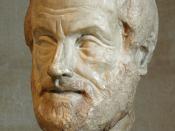Part I, Question 2:
Aristotle distinguishes two kinds of akrasia: impetuosity (propeteia) and weakness (astheneia). The person who is weak goes through a process of reflection and makes a choice; but rather than act in accordance with his reasoned choice, he acts under the influence of a passion. By contrast, the impetuous person does not go through a process of reflection and does not make a reasoned choice; he simply acts under the influence of a passion. At the time of action, the impetuous person experiences no internal conflict. But once his act has been completed, he regrets what he has done.
Aristotle's discussion of akrasia relates to a position held by Socrates. When he first introduces the topic of akrasia, and analyzes some of the problems involved in understanding it, he says that Socrates held that there is no akrasia, and he describes this as a thesis that clearly conflicts with the appearances.
Since he says that his goal is to preserve as many of the appearances as possible, it may come as a surprise that when he analyzes the conflict between reason and feeling, he arrives at the conclusion that in a way Socrates was right after all. For, he says, the person who acts against reason does not have what is thought to be unqualified knowledge. In a way he has knowledge, but in a way does not.
But Aristotle's agreement with Socrates is only partial, because he insists on the power of the emotions to rival, weaken or avoid reason. Emotion challenges reason in all three of these ways. In both the akratic and the enkratic, it competes with reason for control over action. Even when reason wins, it faces the difficult task of having to struggle with an internal rival. Second, in the...


